When Did Enslaved African Americans In Texas Learn About Emancipation?

The Emancipation Proclamation was signed by President Abraham Lincoln on January 1, 1863, though discussion of the edict would not officially reach Texas for another 2 and half years — June xix, 1865. This essay traces the road to the proclamation and besides looks at how Texas was affected and why freedom for Texas slaves was and then much longer in coming.
Video : View a PBS documentary about Juneteenth produced and directed by Jim Bailey, Dusk Productions, for the Texas Constitute for the Preservation of History and Civilisation.
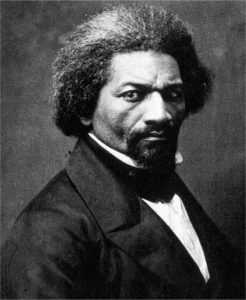
Frederick Douglass
The keen abolitionist and former slave Frederick Douglass called the Emancipation Proclamation, "The nation's apocalyptic regeneration," and it's doubtful that anyone today can fully appreciate the enormity of that moment or the blitz of emotions for the four million black people who destruction of an institution that was an affront to humanity gave new life and hope to a long-suffering people in a land predicated on freedom and justice for all. The document itself, barely 700 words in length, carried moral, political, religious and military meanings and is revered as one of the virtually dynamic in earth history and the homo who brought it to be, Abraham Lincoln, the 16th president of the Us, is largely revered as the great emancipator – outside of the South.
Nevertheless, having defiantly watched equally their means of life and economy forever inverse, Southerners solidly laid blame on Lincoln and viewed the president in much less glowing terms. However, while Southerners were the virtually vocal about keeping transplanted Africans in bondage – for agricultural and social reasons, most citizens of the New World that would abound into the United States of America had begun cultivating attitudes about the slavery from the moment the beginning slave ships docked in this country in the Virginia Colony at Betoken Condolement, on the James River, late in August 1619. In that location, "xx. and odd Negroes," as the manifest read, from the English language ship White Lion were sold in exchange for food and some (if not all) of the Africans were and then transported to nearby Jamestown and sold.
And and then began our deplorable relationship with the peculiar establishment, as slavery has been chosen. The Virginians put Africans to work cultivating tobacco crops considering of its similarity to farming methods Africans had developed in their abode state, in this example probably Angola, in Due west Cardinal Africa. As the colonies grew, and so did the demand for more field labor to grow the ingather, only so too did the weight on the moral conscious of the burgeoning country begin to increase. The fence over human chains vs. human rights in the name of the economy was a spirited one though the underlying and real debate was certainly about the value of one man's existence and whether that man, considering of his color, was inherently inferior in all matters, social, moral, and intellectual.
All men created equal?
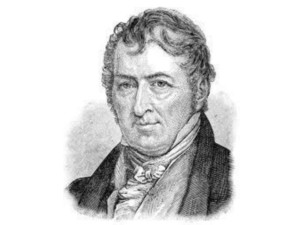
Eli Whitney
The Proclamation of Independence, on the issue of the black man's rights was nebulous, at best, and would just supply more fodder for debate. Lincoln, and then a ascension Illinois Republican, would offering his estimation in 1857, after the U.S. Supreme Courtroom ruled, in the Dred Scott conclusion (where Scott, an Illinois slave, was suing for his freedom). Said Lincoln: "The authors of the Declaration of Independence never intended to say all were equal in color, size, intellect, moral developments, or social capacity, but they did consider all men created equal – equal in certain inalienable rights, amidst which are life, liberty, and the pursuit of happiness."
And then, while the Declaration of Independence may not accept offered guidance on the issue of the blackness man's rights, in that location was nonetheless a sense after the American Revolution that blacks would experience the ethics of independence and what the new country stood for, but that would not last very long as in 1793 Eli Whitney presented his cotton gin and almost overnight the Southern economic system would begin to blast and replace tobacco as the burgeoning nation'due south almost profitable crop, and elevate the need for slavery.
Ten years after the gin (brusque for "engine") first appears, the value of the full U.S. crop rose from $150,000 to more than $eight million. Combined with the developing cloth industry in New England, cotton fiber fuels the industrial revolution, and a marked rise in slave labor. The federal census of 1790 counted 697,897 slaves, but by 1810, that number increased 70 per centum to ane.2 million slaves. However, at the same time, abolitionists had begun voicing the need to eliminate the establishment, but other movements and sentiments thwarted any successful efforts to bring the end of slavery to fruition. For example, the 1793 Fugitive Slave Human action gave whatever white person the correct to merits any black person, free or slave, as a avoiding, and render or sell that person into slavery.
Slavery: "A monstrous injustice "
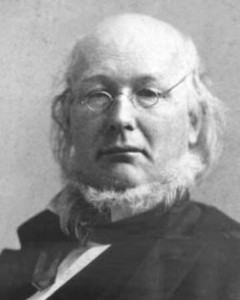
Horace Greeley
There was never any real consideration past the majority of the country that a black man'south station was anything beyond that of a slave. Nevertheless, during his presidential campaign in 1860, Lincoln was strongly supported by the abolitionist movement and their voices were growing stronger. They had crusade for optimism by the time Lincoln took office in 1861 as the first Republican president and a candidate whose party platform had been anti-slavery. Lincoln had always idea slavery a "monstrous injustice," however, he did not consider himself an abolitionist. His aim was to prevent the extension of slavery to new territories in the west though Southerners clearly saw Lincoln as a human on a mission to end slavery which, in turn, would destroy the Southern economy and social order.
For his election as president, the big bulk of his winning votes came from the North and Westward, just in 10 of the 15 Southern slave states, in that location were no ballots bandage for him, and he was victorious in only 2 of 996 counties in all the Southern states. In his inaugural accost, on March four, 1861, Lincoln re-iterated to skeptical Southerners, "I have no purpose, directly or indirectly, to interfere with the institution of slavery in the States where it exists. I believe I have no lawful correct to do so, and I have no inclination to practice so." But, South Carolina had already go the first land to secede from the Union on December 20, 1860, speedily followed in Jan and February by Mississippi, Florida, Alabama, Georgia, Louisiana, and Texas. Virginia joined the Confederacy in April afterward the first shots of the Civil War were fired at Fort Sumter. In May, so did Arkansas, Tennessee, and N Carolina.
Abolitionists increased their button for Lincoln to grant freedom to slaves but the president attempted a precarious balance, not wishing to incite the iv remaining slave states who were still in the marriage – Delaware, Kentucky, Missouri, and Maryland, and on a wider calibration he didn't want to upset the general public who would not be sympathetic or supportive of a war perceived to be about slavery. In a letter to New York Tribune editor and abolitionist Horace Greeley on August 22, 1862, Lincoln wrote, in response to a Greeley editorial: "My paramount object in this struggle is to salvage the Union, and is not either to relieve or to destroy slavery. If I could salve the Union without freeing whatsoever slave I would do information technology, and if I could relieve information technology by freeing all the slaves I would do it, and if I could salvage information technology past freeing some and leaving others alone I would too exercise that."
With the country now raging with state of war, free blacks were eager to participate to help the button for emancipating their brothers in chains, merely also to testify the blackness human being's patriotism, and bravery, which had been a similar theme since the American Revolution – in which the first casualty was a blackness man, Crispus Attucks, during the Boston Massacre. The notion was that armed services service would identify blacks in a improve light as citizens worthy of acceptance by whites and opening doors of opportunity and equal rights. A laudable theory, but wildly unsuccessful throughout history. Service, patriotism, heroism, civic duty, none of that mattered in the grand scheme of racial intolerance and did nothing to further the black human being's quest for civil and human rights.
A White man's war!
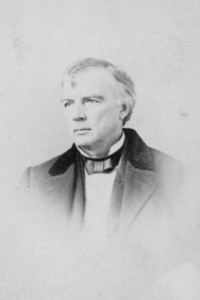
David Tod
Still, equally the Ceremonious State of war begins, blacks in northern cities are literally begging to join the Union ground forces and are soundly rejected at every plough. A group of black men in Boston passed a resolution (to no avail) seeking enlistment: "Our feelings urge u.s. to say to our countrymen that we are fix to stand by and defend our authorities equally the equals of its white defenders; to do and so with our lives, our fortunes, and our sacred honor, for the sake of liberty, and every bit proficient citizens; and nosotros ask you to modify your laws, that we may enlist, that full scope may be given to the patriotic feelings burning in the colored man's breast." In September 1862, black volunteers in Cincinnati sought to join the Ground forces through the formation of local units called "Domicile Guards," only to incur the wrath of the urban center's police chief, who told them: "We want you lot damn niggers to keep out of this; this is a white man'south state of war!" If the primary's statement was in whatsoever style unclear, Ohio Governor David Tod later on amplified: "Do you know that this is a white homo's regime, that the white men are able to defend and protect it, and that to enlist a Negro soldier would be to drive every white man out of the service?"
The perceived purpose of the war was to quell the rebellion and pull the Southern states back into the Union, no matter their reasons for secession, but unspoken was the powder keg of intentions of emancipation through waging state of war, and in no parts of the state did whites desire to hear that was what the war was about. Yet, it was, regardless how painful the reality was for non-abolitionists in the North, and what state's rights Southerners really fought for was the right to concur slaves to perpetuate the cotton economy. The war WAS about emancipation, or as some historians have called information technology, "the War of Treason in Defense of Slavery."
And Lincoln would say as much in his second inaugural accost on March 4, 1865: "One-8th of the whole population were colored slaves, not distributed mostly over the Union, merely localized in the southern function of information technology. These slaves constituted a peculiar and powerful interest. All knew that this interest was somehow the cause of the war. To strengthen, perpetuate, and extend this involvement was the object for which the insurgents would rend the Wedlock even by war, while the Government claimed no correct to practice more than to restrict the territorial enlargement of it." Then, there is a Grab-22, where White non-abolitionists in the n have no intention of enlisting to fight in a war whose objective was emancipation for the "undeserving" Negro, particularly when the Negro himself was not fighting – or allowed to fight. There was too the feeling, given the notion of inferiority, that Negroes were not worthy of wearing the compatible, and giving them arms was totally out of the question. And, maybe higher up all, many whites feared that emancipation encouraged the most detested of all the social taboos: miscegenation, race-mixing.
Blackness men in uniform
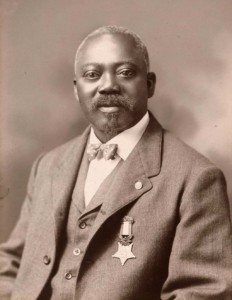
Sgt. William Carney
In some other paradox, whites in the North were increasingly competing with freed blacks for jobs which sometimes led to unemployed whites getting drafted to the Army after being displaced on their jobs by Negroes then beingness sent off to fight in a war to prepare more Negroes costless. Yet, the Union does make attempts to enlist free blacks and slaves in Union loyal states. In 1863, there was a program in which slave owners could receive up to $300 for each slave allowed to enlist in the Ground forces. Merely there was likewise defoliation inside the authorities's ranks in how all-time to treat slaves who escaped to safety behind Matrimony lines. There was no official policy on what to do with them. Some Union officers declared them "contraband of war," given they had been aiding the Confederacy by working to build fortifications and property other jobs in support of the Amalgamated Regular army. Other Matrimony officers saw that runaway slaves were returned to their masters. Past the end of the war, an estimated 500,000 slaves had successfully found their fashion to freedom backside Wedlock lines.
The solution was the Showtime Confiscation Act on August half-dozen, 1861 which provided, basically, that whatsoever captured slaves who had been working for the Confederate Army were to be "forever gratis." The 2d confiscation Act, July 17, 1862, freed all rebel-endemic slaves who escaped behind Union lines. On that same date, the Militia Human activity freed all slaves in Union Ground forces employ. Blacks eventually would serve in large numbers after emancipation, and in many cases would bear witness to be valiant in battle, as "colored troops," nigh notably the 53rd Mass., the subjects of the film "Celebrity," for their courageous performance at Fort Wagner. Their participation in that battle produced Sgt. William Carney, the first African American to receive the Congressional Medal of Honor. Over two hundred members of the 62nd United States Colored Infantry (recruited from Missouri in 1863) fought in the Battle of Palmito Ranch on May 12-13, 1865 in S Texas, which is noted every bit the last skirmish of the Civil War.
Approximately 180,000 African Americans comprising 163 units served in the Spousal relationship Army during the Civil War, and many more served in the Marriage Navy. Both gratuitous blacks and delinquent slaves joined the fight and African American soldiers would participate in every major campaign of 1864-1865 except Sherman's invasion of Georgia. On July 17, 1863, at Love Springs, Indian Territory (Oklahoma), the 1st Kansas Colored fought with courage commanded by Gen. James Edgeless when they ran into a strong Amalgamated force under Gen. Douglas Cooper. After a two-hour bloody engagement, Cooper's soldiers retreated. The 1st Kansas, which had held the heart of the Matrimony line, advanced to inside 50 paces of the Amalgamated line and exchanged fire for some twenty minutes until the Confederates broke and ran. Blunt wrote afterwards the battle, "I never saw such fighting as was done past the Negro regiment….The question that Negroes volition fight is settled; besides they brand better solders in every respect than any troops I have always had nether my command."
Back to Africa?
There were 2 other fundamental movements towards emancipation:
- April 1862 – congress outlaws slavery in D.C. and the Western territories. It'due south interesting, though, that in doing so Lincoln as well recommended colonization for the freed slaves with the regime providing $100,000 for the voluntary emigration of freedmen to Haiti and Republic of liberia. And in August of that twelvemonth, he met with a group of prominent Negroes at the White Firm seeking their back up for colonization, telling them: "Your race suffer profoundly, many of them, past living amid us, while ours suffer from your presence. In a word, we suffer on each side. If this is admitted, it affords a reason why we should be separated." Some South American and African governments were approached near the idea. While zero became of colonization, Lincoln never fully gave up on the thought of sending freed slaves back to Africa and other countries, but there is no mention of colonization in the Emancipation Proclamation.
- On June 19, 1862, Lincoln signs a neb abolishing slavery in the western territories and on July 17, and a mensurate becomes law setting free all slaves coming from disloyal masters into Spousal relationship-held territory.
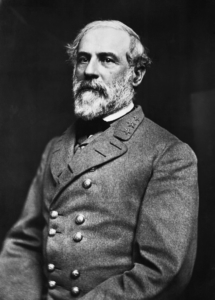
Gen. Robert Eastward. Lee
Lincoln's piecemeal approach to ending slavery was having success, simply Constitutional restraints prohibited him from making emancipation a reality on a wider scale. All the same, as commander in chief of the Army, he could circumvent the Constitution and end slavery for military reasons. The Amalgamated Regular army used slaves in back up roles for the rebel cause, including maintaining operations at plantations and farms while their masters are away for the fight. Granting freedom to slaves in the South would greatly weaken the Confederate war attempt. Indeed, the South will be doomed. On September 17, 1862, Union and Confederate soldiers fight what volition be the bloodiest batter in American gainsay history with over 23,000 casualties on both sides. Antietam was Confederate Gen. Robert E. Lee's first foray into Union territory, a risky gamble that did non pay off. Lee withdrew from the expanse the following morning, and it's the moment Lincoln and his Chiffonier have been pending. Non wanting to appear desperate beforehand, they had been seeking a decisive battlefield victory to bolster the president's emancipation declaration.
Free at concluding…somewhat
In reality, it was a thinly veiled Spousal relationship victory heightened by Lee'due south retreat after the exhaustive battle that left both sides severely battered, but that was enough for Lincoln. Five days after the Antietam fight, he issued his preliminary proclamation announcing his intention to free slaves in rebellious states on Jan. ane unless the Confederate states rejoin the marriage. Only abolitionists are excited by the motility. The Confederate States stand up fast. In anticipation of emancipation finally becoming a reality, on December 31 there are spotter meetings in several Northern cities held by Negroes and whites attended by abolitionists such as Douglass, William Lloyd Garrison, and Harriet Beecher Stowe. On Jan. ane, the annunciation frees iii-fourths of the slaves – all in the Confederacy, where slave owners ignored Lincoln's "deed of justice warranted by the Constitution upon military necessity."
However, there are 800,000 slaves unaffected in the four loyal slave states, 13 parishes in Louisiana, including New Orleans, 48 counties in Virginia (which had go West Virginia), and seven counties in eastern Virginia, including Norfolk and Portsmouth. Today, when the president signs a major piece of legislation, there are dozens of interested parties standing effectually his desk and receiving ceremonial pens and taking photos. Nevertheless, Lincoln unceremoniously signs 1 of the most incredible documents in history in the presence of less than a dozen people, as he juggled the signing with appearing downstairs at a New year's day's Day reception at the executive mansion. And, apparently, he had shaken so many hands at the reception that he had difficulty holding the pen to sign the document. The gravity of the moment, withal, and his legacy was very clear to the president, who would say: "I never, in my life, felt more certain that I was doing right, than I do in signing this paper," he alleged. "If my proper name ever goes into history it will be for this act, and my whole soul is in information technology."
Equally word of the announcement filtered downwards to slaves, the security of whites in the South and maintenance of its stable economy became major issues. The Confederate war endeavor could not go on successfully without slave labor, in the battlefields or the cotton fields and other farms. And every bit slaves gradually became enlightened of their freedom, well, the film of slavery took a dramatic new prototype. Between 1861 and 1965, slaves walked off plantations and abroad from bondage whenever Spousal relationship troops were almost. Slave owners attempted to refugee their slaves, or "run the Negroes," removing them abroad from Matrimony lines, hiding them from federal troops – which is how many slaves first came to Texas (possibly as many as 50,000, maybe as much as 3 times that many AFTER the proclamation) from other Southern states.
Texas was a safe haven for slaveholders because of the limited Spousal relationship presence in the land. There were no major Civil War battles in Texas so no opportunities for slaves to seek shelter behind Marriage lines. Slavery in Texas during the state of war was relatively unaffected and with that knowledge slaveholders moved their slaves to Texas and re-established their plantations. Some freedmen seized the opportunity to turn on their masters. One Mississippi denizen wrote for state help in keeping blacks in line: "There is greatly needed in this county a company of mounted rangers…to keep the Negroes in awe, who are getting quite impudent. Our proximity to the enemy has had a perceptible influence on them." In another instance, a slave learned that he was free and "went straightly to his main'due south chamber, dressed in his all-time clothes, put on his best watch and chain, took his stick, and returning to the parlor where his primary was, insolently informed him that he might for the hereafter to bulldoze his own coach." Others merely refused to work or accept punishment and whites, in some cases, even appealed to Spousal relationship troops for protection from former slaves.
Enlisting slaves for the Confederate Regular army
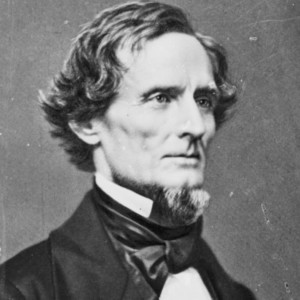
Jefferson Davis
The Confederacy relied on slave labor to exercise the non-gainsay work of the state of war as cooks, teamsters, mechanics, infirmary attendants. However, when inevitably pressed for manpower, Confederate leaders debated the idea of enlisting slaves for the Southern cause most the Civil War's end with Union troops marching through the Southward claiming victory after victory. Eventually, there were some blacks who wore the uniform of the Confederacy, but the widely accustomed opinion on their exclusion from donning the battle greyness uniforms was as Confederate General Clement H. Stevens stated in reference to the recruitment of slaves for the preservation of Dixie: "I practise not want independence if it is to be won by the help of the Negro…The justification of slavery in the South is the inferiority of the Negro. If we make him a soldier we concede the whole question."
In March 1865, with the tide turned incomparably in favor of the Due north, Confederate President Jefferson Davis approved the enlistment of 300,000 slaves, with the predictable promise of freedom, just their addition came much too late to help Johnny Reb. Lee surrendered on April 9, 1865, but information technology would non exist until August xx, 1866 that President Andrew Johnson would officially declare the war over. With the S crushed and Reconstruction underway, states ratified, in brusque social club, the 13th Subpoena (December 6, 1865), which outlawed slavery, the 14th Amendment (July 9, 1868), granting citizenship to "all persons born or naturalized in the The states," which included quondam slaves, and the 15th Amendment (February 3, 1870), which gave the correct to vote to erstwhile slaves.
Slavery and the Lone Star Country
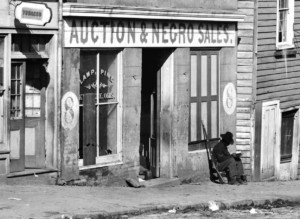
Slave auction business firm
Where is Texas in all of this? Texas was readmitted to the Wedlock on March thirty, 1870. However, since there were no major battles during the war in Texas, slave life in the state continued relatively unaffected, other than the influx of "refugee" slaves. Slave owners and male family members did venture off to fight for the Confederacy, leaving, in some cases, male person slaves in charge of running plantations and farms. It's possible that some of the refugees may have brought news to Texas slaves almost emancipation, but with no existent Union presence in the land, there were no opportunities for slaves to bolt to liberty. Union forces never fabricated it to the state'southward interior, where there were approximately 200,000 enslaved people when the state of war began. Galveston was occupied briefly in the fall of 1862, simply on New year's Day, 1863, the very day when the Emancipation Proclamation took effect, Amalgamated forces led by General John Bankhead Magruder recaptured the port.
After Marriage attempts to occupy Texas were either limited to the state's southern coastline, far away from the Due east Texas counties with the densest slave populations, or they were turned back before they even reached Texas. Only 30 per centum of Texas families owned slaves in 1850, and but ii per centum of those held 20 or more than slaves. Nonetheless, Texans had not but fully grasped slaver-owning concepts, but were downright light-headed virtually the hereafter prospects of slaves cultivating the country's fertile soil, especially its cotton ingather. In the late 1850s, an editorial in Austin'south Texas State Gazette suggested that "until we achieve somewhere in the vicinity of two millions of slaves, it is axiomatic that such a thing every bit too many slaves in Texas is an absurdity." Charles DeMorse of the Clarksville Northern Standard was more direct: "Nosotros desire more slaves, we need them."
In 1860, Texas was the 5th-largest cotton-producing land in the country, with xc percent of the country's produced by farmers or plantation owners who owned slaves. In 1865, a resolution emerged from a public coming together in Goliad that "the word of the question, whether it is expedient or politic to abolish southern slavery, is premature, unwise and unnecessary, and impressed the Northern listen with the conventionalities that nosotros feel unable to sustain the institution…(slavery) is not to be wrested from us past any power on earth." It should be noted that it was in Goliad where the first boxing of the Texas Revolution occurred in 1835 and the first casualty of that conflict – and, thus, the Revolution – was a free black homo, Samuel McCullough. Yet, the war certainly had a price on Texas. The ripple effect of the Southern economic system'south declining reached Texas and many of its Confederate soldiers returned to their farms to find devastation and there was no greenbacks to be had for rebuilding. But, in the early months of 1865, Texas newspapers still independent advertisements of slaves for sale as Texans went about their slave-holding business concern as usual openly defying compliance with the proclamation.
Some Texas slaves reported being in chains as much as six years after emancipation, and after Juneteenth, blacks were murdered, lynched, and harassed by whites. "The war may not take brought a dandy deal of bloodshed to Texas," notes N Texas University historian Elizabeth Hayes Turner, "only the peace certainly did." Slave "patrols" of whites scoured the countryside for runaway blacks, who were beaten and sometimes killed. The aforementioned held true for sympathizing whites.
The fear and uncertainty about emancipated slaves was evidenced in stories appearing in the Galveston newspaper, wondering about the white citizens' plight, economically and socially, under "a authorities in which we have now no voice." Another piece, in the Galveston Tri-Weekly News, on June 21: "This attempt to overthrow an establishment that has become a part of our social system and which our entire population has believed essential to the welfare of both races, led to the war … and all we tin practice in our present unabridged dependence on the charity of our conquerors, is to repeat to them what we have been urging for so many years … that the attempt to set up the negro complimentary from all restraint and make him politically the equal of the white man, will be virtually disastrous to the whole country and absolutely ruinous to the Southward."
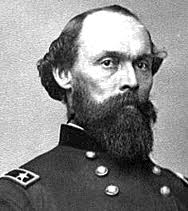
Gen. Gordon Granger
That was the mood that greeted Gen. Granger and his troops, who met no resistance at Galveston, ii and a half months subsequently Lee's surrender and three weeks after Gen. Due east. Kirby Smith had surrendered the terminal regular Texas Confederate soldiers at Galveston Island. Granger was sent to control the Section of Texas and among his first duties was announcing General Order No. 3: "The people are informed that, in accordance with a proclamation from the Executive of the United States, all slaves are costless. This involves an absolute equality of personal rights and of property, between former masters and slaves, and the connection heretofore existing between them, becomes that between employer and hired labor: The Freedmen are advised to remain at their present homes, and piece of work for wages. They are informed that they will non be allowed to collect at military posts; and that they will not be supported in idleness either there or elsewhere." Granger set a provisional government as some of his troops connected throughout South and East Texas enforcing the "official" mandate of liberty.
Why had it taken then long for the word about emancipation to reach this country? In that location are varying accounts, some myths, of why the news was delayed in getting to Texas. Accept your option:
- A messenger was murdered on his fashion to Texas.
- The news was deliberately withheld by enslavers to maintain the labor forcefulness on the plantations.
- Federal troops actually waited for the slave owners to reap the benefits of ane last cotton harvest before going to Texas to enforce the proclamation.
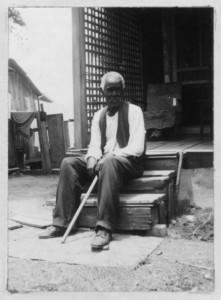
Felix Haywood
Whatever the reason – almost likely the lack of Marriage troops in Texas during the war – it didn't seem to affair. Freedom had come to Texas slaves. Granger'south announcement triggered shockwaves of joy, fear, and confusion throughout the surface area. Blacks were happy, Whites were scared, and large segments of both groups generally had no idea what to brand of the situation. One former slave, Felix Haywood offered this insight in the Slave Narratives. "Everybody went wild. We all felt like heroes … just like that we were free. Information technology didn't seem to make the whites mad, either. They went right on giving us food just the aforementioned. Nobody took our homes, simply correct off colored folks started on the movement. They seemed to want to get close to freedom … like it was a place or a urban center. We knew freedom was on united states of america, just nosotros didn't know what was to come up with it. We thought nosotros were going to get rich like the white folks. We idea we were going to be richer than the white folks, because we were stronger and knew how to work, and the whites didn't, and we didn't have to piece of work for them anymore. But it didn't plough out that way. We soon institute out that freedom could make folks proud merely information technology didn't make them rich."
Here is what some others said through the Slave Narratives:
- "When my oldest brother heard we were free, he gave a shoop, ran, and jumped a high debate, and told mammy good-bye. Then he grabbed me upward and hugged and kissed me and said, `Blood brother is gone, don't expect you'll always see me whatsoever more than.' I don't know where he went, but I never did see him once again."
- "I remember that give up solar day. He called usa round him. I can see him at present, similar I watch him come to the yard with his hands clasped behind him and his head lowered. He said, `I beloved every i of you. You've been faithful, but I have to give y'all up. I detest to do it, non because I don't want to complimentary you just because I don't want to lose you lot all.' Nosotros saw the tears in his optics."
- "When the news came in that we were complimentary, Primary Harry never chosen usa like everybody else did their slaves; we had to get up and inquire him about it. He came out on the front gallery and said we were free and turned effectually and went in the house without another word."
- "Us niggers was set gratis on June 19, 1865. We was told dat we was goin' to git sixty acres and a mule. We never git nothin' lak dat."
- "The niggers bellered and cried and didn't want to leave massa. He talked to us and said as long every bit he lived we'd exist carte for, and we were. … He willed every last one of his slaves something. … My mammy got two cows and a pair of horses and a carriage and seventy acres of land."
- "Before the state of war massa didn't ever say much about slavery, but when he heard we were free, he cussed and said, `God never did intend to gratuitous niggers,' and he cussed til he died. Simply he didn't tell us we were complimentary til a whole year later we were."
- Where Douglass had seen emancipation as a positive apocalypse, at least one slave owner had a very different vision: "Missy plant Marster Billy dead in the shed, with his throat cut and the razor beside him. There was a piece of paper proverb he did not intendance to live because the niggers were free."
The Galveston Daily News, on June 21, 1865, saw it similar this: "Their freedom tin can never make them the equals of the white race. … God himself has fabricated a marked distinction between the white and black races, which no man laws, nor all the abolitionists in the earth, can ever obliterate." In 1979, Gov. Bill Clements signed a beak making June xix "Emancipation Day in Texas,'" a legal holiday. Emancipation for Blacks in Texas, for former slaves throughout the Marriage, no matter how awkward its first steps, would defy even the well-nigh dire predictions for what was to get of a race of people of a sudden given the ability to decide their ain direction and overcome such notions as this one: "The extinction of slavery is only the extinction of the Negro race."
Sources:
- Franklin, John Hope, "From Slavery to Freedom, A History of Negro Americans," Tertiary Edition, New York: Vintage Books, 1969.
- Williams, David A., "Bricks Without Straw, A Comprehensive History of African Americans in Texas," Austin: Eakin Press, 1997
- Marten, James, "Slaves and Rebels – The Peculiar Institution in Texas, 1861-65," p. 40-48, in "Blacks in East Texas History," Edited by
- Bruce A. Glasrud & Archie P. McDonald. College Station: Texas A&M University Printing, 2008.
- Barr, Alwyn, "Black Texans, A History of Negroes In Texas, 1528-1971," Austin: Jenkins Publishing Co., 1973
- Campbell, Randolph B., "An Empire for Slavery, The Peculiar Institution in Texas, 1821-1865," Baton Rouge: Louisiana State University Printing, 1989
- Austin American-Statesman , " Slaves' emancipation came a little later to Texas, " Michael Hurd, June 19, 1995, p. A1
Online:
- http://www.archives.gov/exhibits/featured_documents/emancipation_proclamation/
- http://www.loc.gov/rr/programme/bib/ourdocs/EmanProc.html
- http://memory.loc.gov/ammem/alhtml/almintr.html
- http://www.pbs.org/wgbh/aia/part4/4h1549.html
- http://www.civilwar.org/education/history/emancipation-150/10-facts.html
- http://www.mrlincolnandfreedom.org/inside.asp?ID=69&subjectID=4
- http://www.bartleby.com/124/pres32.html
- http://world wide web.abrahamlincolnonline.org/lincoln/speeches/inaug2.htm
- http://www.ehow.com/about_4567222_slave-owners-texas.html#ixzz24UelCepH
- http://theragblog.blogspot.com/2011/10/bob-feldman-slave-state-of-texas-1846.html
- http://world wide web.tshaonline.org/handbook/online/articles/qdc02
- http://www.tbhpp.org/emancipation.html
- http://en.wikipedia.org/wiki/Emancipation_Proclamation
- http://www.history.com/topics/emancipation-proclamation
- http://www.mrlincolnandfreedom.org/inside.asp?ID=39&subjectID=iii
- http://wcm1.web.rice.edu/before-juneteenth-talk.html#fn6
- http://freepages.genealogy.rootsweb.ancestry.com/~ewyatt/_borders/Texas%20Slave%20Narratives/Texas%20Index.html
Source: https://www.pvamu.edu/tiphc/research-projects/juneteenth-the-emancipation-proclamation-freedom-realized-and-delayed/
Posted by: clapperhavers.blogspot.com


0 Response to "When Did Enslaved African Americans In Texas Learn About Emancipation?"
Post a Comment